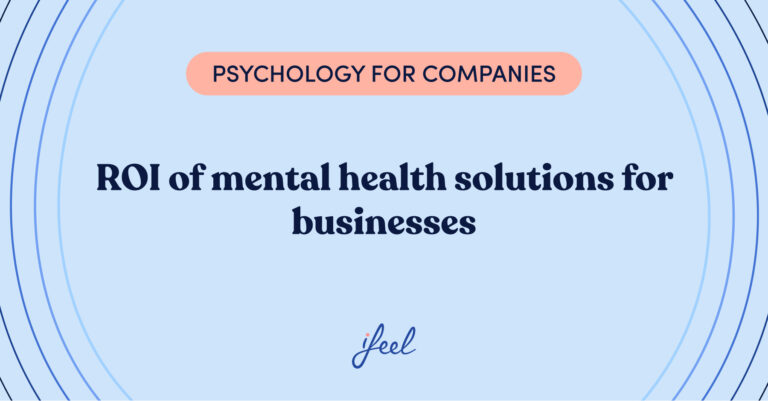The DEIB (Diversity, Equity, Inclusion, and Belonging) strategy, an extension of the well-known Diversity, Equity, and Inclusion (DEI) approach in the workplace, is rising in importance. Although both aim to make the workforce a healthier place, DEIB includes a new aspect that has a big impact on employees and their mental well-being at work.
This article explores what ‘B’ stands for, how this new strategy differs from the old one, and how its implementation can benefit employees’ mental well-being.
What does DEIB stand for?
If you’re in charge of your company’s HR department, DEI should be at the forefront of your human capital strategy, as it’s a core aspect of cultivating a healthy workplace environment. DEIB, however, includes a new concept, which is also key for creating a safe and secure environment for all employees. Here’s a breakdown of DEIB:
Diversity – Diversity encompasses people with different characteristics, identities, and backgrounds in the professional environment. This covers aspects such as ethnicity, race, age, gender identity, sexual orientation, and mental and physical ability.
Equity – Equity refers to policies that enable employees to thrive in the workplace. Equality means treating everyone as if their shared experiences were exactly the same. Being equitable means acknowledging and redressing structural inequalities that benefit some and disadvantage others.
Inclusion – Inclusion means every member of staff feels welcome and is respected. It also means everyone is treated equally and given the opportunity to participate. Inclusion paves the way for employees to be heard and feel confident contributing to the company.
Belonging – A sense of belonging refers to the feeling of being an accepted and valued member. In addition, it also means having a shared sense of connection to the company and its employees through meaningful relationships.
All of the above need to be present and in full force in a company’s HR policy. All four aspects must also be embedded in the corporate culture so that the strategy properly impacts employees. It is important to emphasise the importance of a DEIB policy from the moment an employee begins their journey at the company.

What is the difference between DEI and DEIB?
The clear difference between DEI and DEIB is the addition of the latest policy of belonging. Creating a sense of belonging from the beginning is key for employees to feel accepted in the workplace. A company can be diverse, equitable, and inclusive, but the real result is when employees start to feel valued and their voice is heard.
DEIB goes a step further in creating an open and welcoming workplace environment. Fostering a sense of belonging proves the company is willing to provide psychological safety for employees. This helps them feel comfortable and confident in their work and their relationships at work, which is also an important part of their employee experience.
What are the benefits of implementing a DEIB strategy?
1. Employee performance
Employees’ performance and engagement automatically improves if a strong DEIB policy is implemented. This is because a DEIB strategy creates a positive work environment where employees feel included and comfortable. Therefore, they thrive in the workplace through fair opportunities and can explore new ones as well. This helps boost their motivation, engagement, and overall performance.
2. Corporate reputation
Organisations with solid DEIB initiatives are frequently viewed as forward-thinking and modern, which attracts a wider range of employees. A company’s corporate culture is key for those seeking a new job. Apart from salary, working in a fair and inclusive environment is a very important aspect future employees look for. It shows an organisation takes social responsibility and welcomes people for their abilities, not their background.
3. Overall company success
Demonstrating a commitment to diversity and inclusion is a sign of social responsibility that resonates positively with customers, investors, and the wider community. A diverse workforce brings a range of insights and experiences, fostering innovation and problem-solving skills within the organisation. This innovation can lead to the development of new products, services, or approaches, improving the company’s competitiveness
4. Mentally healthy employees
Building a diverse workforce helps employees feel comfortable around their colleagues and in the work environment. Diversity helps employees connect with one another, which benefits their mental well-being. In an inclusive environment, individuals from various backgrounds can bring their authentic selves to work, reducing the stress associated with hiding aspects of one’s identity. Moreover, a culture of inclusion and belonging helps create supportive networks, reducing employees’ feelings of isolation and loneliness.
Ways to Implement a DEIB Strategy in Companies
Implementing a DEIB (Diversity, Equity, Inclusion, and Belonging) strategy in a company is crucial for creating a fair and respectful work environment. Below are various implementation methods that can help foster an inclusive and equitable workplace culture.
| Strategy | Description | Examples of Implementation |
|---|---|---|
| Recruitment | Attract and hire a diverse workforce. | – Posting job listings on diverse platforms. – Implementing internship and mentorship programs for underrepresented groups. |
| Training and Development | Train employees on DEIB topics and promote their professional development. | – Sensitivity and diversity training workshops. – Leadership development programs for underrepresented groups. |
| Policies and Procedures | Create and maintain policies that promote equity and inclusion. | – Non-discrimination and equal opportunity policies. – Procedures for reporting and managing discrimination or harassment incidents. |
| Culture and Values | Foster a company culture that values diversity and inclusion. | – Celebrating events and international days that promote diversity. – Cultural awareness initiatives and integration programs. |
| Evaluation and Monitoring | Measure and evaluate progress in DEIB. | – Employee climate surveys to assess perceptions of the DEIB strategy. – Data analysis and diversity audits. |
| Compensation and Benefits | Ensure all employees receive fair and equitable compensation. | – Salary reviews to detect and correct disparities. – Inclusive benefits such as extended parental leave and flexible work options. |
| Internal Communications | Promote open and transparent communication about DEIB. | – Newsletters and announcements highlighting DEIB initiatives and achievements. – Communication channels for employees to express concerns. |
| Employee Resource Groups (ERGs) | Support the creation of employee groups that promote DEIB. | – Establishing ERGs for different communities within the company. – Support and resources for activities and projects led by ERGs. |
| External Collaboration | Work with external organizations and communities to promote DEIB. | – Partnerships with organizations that promote diversity and inclusion. – Participation in DEIB events and conferences. |
| Leadership and Accountability | Ensure inclusive leadership to drive DEIB progress. | – Inclusion of DEIB goals in leaders’ objectives. – Continuous training for leaders on diversity and inclusive management. |
This table provides an overview of how a company can effectively implement DEIB strategies, covering various areas and practices within the organization.

Inspiring growth in organisations
At ifeel, we know that implementing a DEIB strategy is key to ensuring employees’ growth in a healthy workplace. Moreover, if employees feel mentally stable and well at work, it will automatically drive them to do better, leading to overall organisational success. We understand it can be challenging to implement such a strategy from scratch without professional help. However, the results such strategies give the company are exceptional, especially with the help of occupational psychologists.
To support companies in this process, our team of expert workplace well-being psychologists has created a mental well-being solution for businesses that improves talent retention, reduces presenteeism, and combats employee stress.
With our mental well-being solution, your company’s HR managers can receive personalised, data-driven advice on improving mental health at work. In addition, this solution offers employees a 360° mental well-being service structured at different levels according to their needs. Try our solution now to see how it could help you.
We hope you found this article about the DEIB strategy interesting. If you would like more information about our mental well-being solution for companies, simply request it, and we will contact your team as soon as possible.







